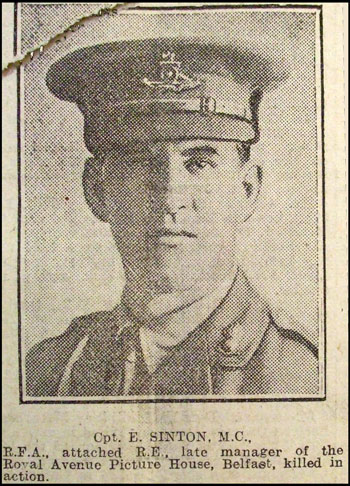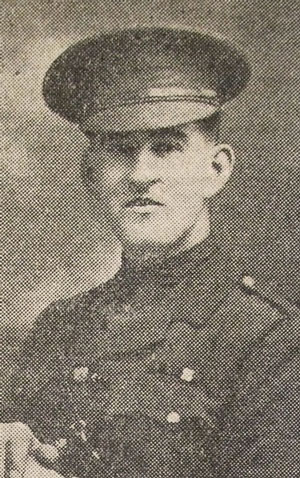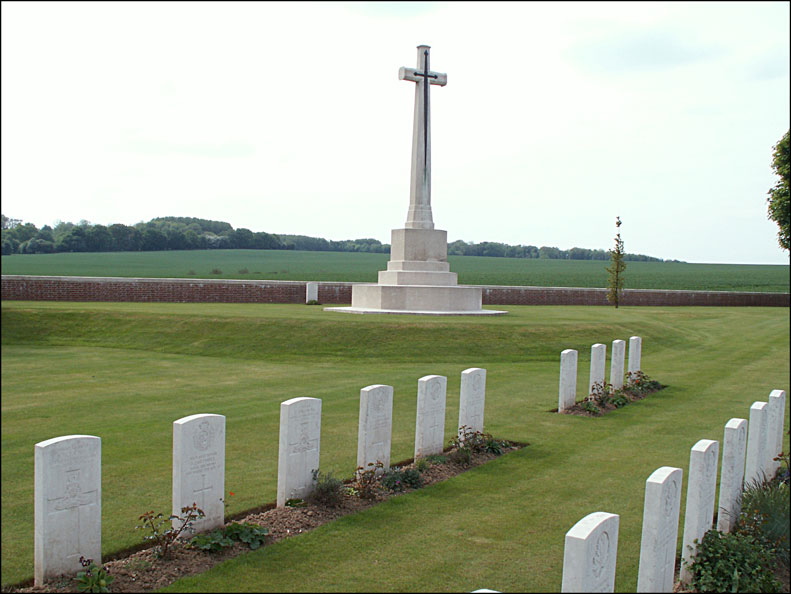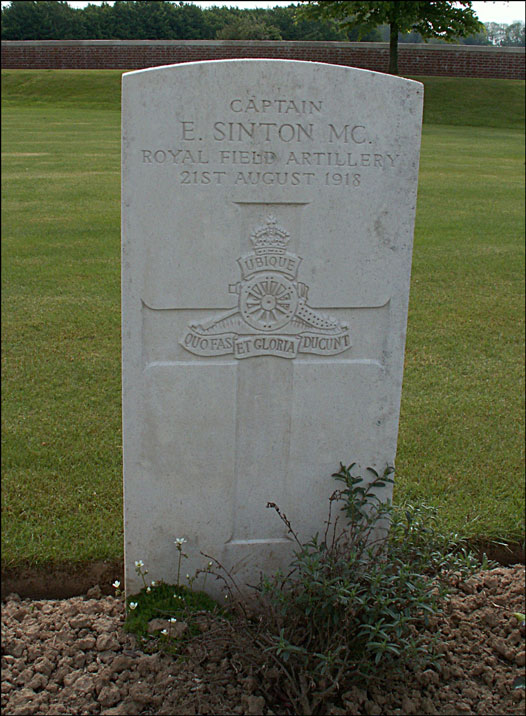![]() In memoriam
In memoriam ![]()
Captain Edwin Sinton, MC

Edwin Sinton was born on 1 December 1882 at Bessbrook, Newry, youngest son of baker Samuel Sinton and his wife Elizabeth (nee Wright). He was educated at the Friends School, Lisburn, and Ulster Provincial School.
During the Boer War he served as a lance corporal in the 74th Company, 8th Battalion, Imperial Yeomanry (No.34517), from 1 March 1900 to 1 June 1902. According to a report in a newspaper in 1914 or 1915:
He served with the I.Y. in South Africa, and saw a good deal of fighting with Colonel Crabbe and Colonel Bethune in Cape Colony. He was one of the five men selected to represent his squadron at the late King Edward's funeral, and for a considerable time after he returned to Africa he held an important appointment in the Cape Government railways. He subsequently joined the Cape Mounted Police and served in British Bechuanaland, Vryburg, Taungs, and Mafeking districts, and also in the most northerly station in the Kalaharia desert with the camel corps. When the construction of the Cape to Cairo railway was begun he left the police and had a varied experience on the line. On returning to Belfast a few years ago to recruit his health after an attack of malarial fever, he decided to enter the cinematographic business, and took up the management of the Shankill Picturedrome. Later on he became manager of the Picture House, Royal Avenue.
Sinton enlisted in the North Irish Horse at Belfast on 1 September 1914 (No.1076). Five days later he was promoted to sergeant.
On 22 October 1914 he was commissioned as a 2nd lieutenant in the Royal Horse and Royal Field Artillery. He was posted to the 16th Division's 75 Brigade Ammunition Column. On 8 December 1915 he was promoted to lieutenant.
Sinton married Mabel Alice Blackwell, a daughter of Major F. Blackwell of the Royal Engineers, at St Mary's, Reading, in April 1916.
On 25 April 1917 he embarked for France. During that year he was attached to the No.4 Light Railway Operating Company of the Royal Engineers and in September was made acting captain.
Sinton saw action during the German Spring Offensive of March and April 1918, and was awarded a Military Cross. His citation reads:
For conspicuous gallantry and devotion to duty. Under very heavy shelling set a fine example of cheerful disregard of danger, and was of great assistance in evacuating light railway stock and maintaining traffic until the advance of the enemy rendered further work impossible.
In August 1918 Sinton was serving with his railway company near Villiers-au-Bois, north-west of Arras. On the 21st he was killed by enemy shellfire. A fellow officer wrote to his widow with particulars of his death:
It is a terrible blow to every one of us, and every man of the company feels it keenly. As for myself I can hardly realise it. He was my best pal out here, and was simply worshipped by his men, who would have done anything for him, and well he deserved their trust. I was not beside him at the time of his death, as I had gone away two days previously to another detachment. The bomb which killed him dropped a short distance from where your husband and Lieut. O'Sullivan were standing. Death was instantaneous, and you can rest assured he suffered no pain. O'Sullivan was just beside him, and they were comrades in death as well as in life. Captain Sinton was very good to me. He was good to everyone, and I think he knew how fond I was of him. It will be a terrible thing for you to bear, but you must keep a stiff upper lip. Many and many a time when we were sitting together he spoke of you – he was always thinking of you. They were buried at 6.30 yesterday evening with full military honours, and lie side by side in a peaceful spot out here. The funeral was most impressive, and his popularity was easily seen when I say that practically every officer of the Light Railway Corps that possibly could be present was there; yes, and more [than] that, every man from every company who could get [there] was present, too. We have lost one of the best and straightest men who ever lived.
(Ballymena Weekly Times, September 1918)
Captain Sinton was buried at Villers Station Cemetery, Villers-au-Bois, Pas-de-Calais, France, grave XI.C.19. His gravestone inscription reads:
CAPTAIN
E. SINTON MC.
ROYAL FIELD ARTILLERY
21ST AUGUST 1918
Two men of the Royal Engineers killed in the same explosion are buried on either side of him – Lieutenant Thomas George O'Sullivan of Limerick, and Sapper J. Cartmell of Blackpool.
Sinton's wife Mabel spent much of the war as a nursing sister in France and England with Queen Alexandra's Imperial Military Nursing Service, and was awarded a Royal Red Cross Decoration – Associate (2nd Class).

Sinton as a 2nd lieutenant in 1914

In the image above, Sinton's grave is third from the left in the front row.
Gravestone images kindly provided by Simon Godly - see his First World War website at www.webmatters.net. Images 1 and 3 kindly provided by Nigel Henderson, Researcher at History Hub Ulster.

